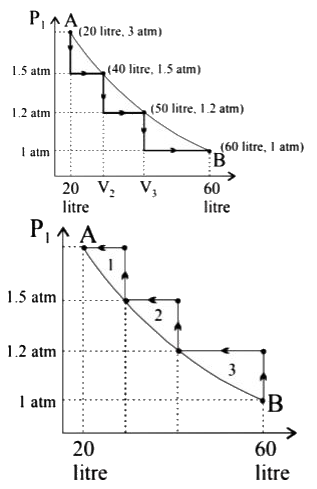A certain quantity of an ideal gas is expanded from 20 L to 60 L isothermally in three steps. The pressure of these three states are 1.5 atm, 1.2 atm and 1 atm respectively. Now, the gas is brought back to the initial state by the given three steps again. Calculate the total work done on the system during this cycle in J. (Take: 1 atm - L = 100 J)
The correct Answer is:C

So, the net work done on the system, will be the difference in the work done or the area enclosed by the cycle.
Total work done
=20×1.5L atm+0.3L atm+0.2×10Latm=35 L atm
∴1atm L=100J
∴wtotal=3500J
Topper's Solved these Questions
Similar Questions
Knowledge Check
If 4 moles of an ideal gas at 300 K occupy volume of 89 . 6 L , then pressure of the gas will be (A) 2 atm (B) 1 atm (c) 1.099 atm (D) 2.910 atm
A2 atmB1 atmC1.099 atmD2.910 atmIf 1.5 L of an ideal gas at a apressure of 20 atm expands isothermally and reversibly to a final volume of 15 L, the work done by the gas in L atm is:
A69.09B34.55C−34.55D−69.09A certain gas in expanded from (1L,10atm) to (4L,5atm) against a constnt external pressure of 1atm. If the initial temperature of gas is 300K and heat capacity for the process is 50J∘C−1, the enthalpy change during the process is: (use: 1L−atm=100J)
A15kJB15.7kJC14.3kJD14.7kJ
A gas expands from 4.0 L to 4.5 L against a constant external pressure of 1 atm. The work done by the gas is (1 L-atm = 101.3 J)
View SolutionA quantity of 4.0 moles of an ideal gas at 20∘C expands isothermally against a constant pressure of 2.0 atm from 1.0 L to 10.0L. What is the entropy change of the system (in cals)?
View SolutionOne monoatomic gas is expanded adibatically from 2L to 10L at 1 atm external pressure find ΔU (in atm L)?
View SolutionOne mol an ideal gas is expanded from(10atm,10lit). (2atm,50lit) isothermally . First against 5 atm
then against 2 atm . Calculate work done in each step and compare it with single step work done.
View SolutionA certain gas in expanded from (1L,10atm) to (4L,5atm) against a constant external pressure of 1atm. If the initial temperature of gas is 300K and heat capacity for the process is 50J∘C−1, the enthalpy change during the process is: (use: 1L−atm=100J)
View Solution
